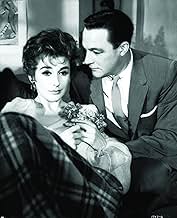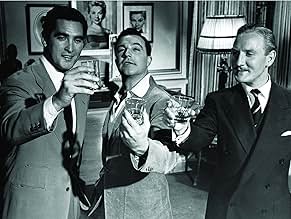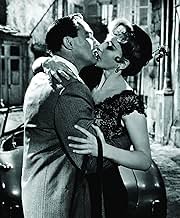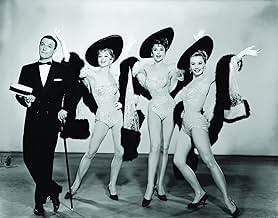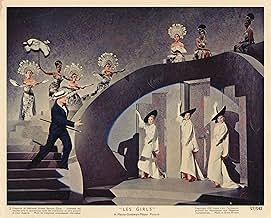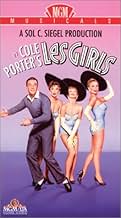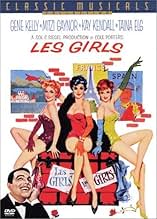IMDb-BEWERTUNG
6,6/10
3227
IHRE BEWERTUNG
Füge eine Handlung in deiner Sprache hinzuThe former members of a dance troupe are suing because of recently published memoirs. Each one insists on own point of view.The former members of a dance troupe are suing because of recently published memoirs. Each one insists on own point of view.The former members of a dance troupe are suing because of recently published memoirs. Each one insists on own point of view.
- 1 Oscar gewonnen
- 7 Gewinne & 7 Nominierungen insgesamt
Richard Alexander
- Stagehand
- (Nicht genannt)
Gordon Armitage
- Courtroom Spectator
- (Nicht genannt)
Frank Arnold
- Taxi Driver
- (Nicht genannt)
Herman Boden
- Angèle's Backup Musician
- (Nicht genannt)
Brad Brown
- Court Barrister
- (Nicht genannt)
Barrie Chase
- Dancer in 'Les Girls' Number
- (Nicht genannt)
Lilyan Chauvin
- Dancer
- (Nicht genannt)
Robert Cole
- Biker in 'Gone About that Gal' Number
- (Nicht genannt)
Empfohlene Bewertungen
I love classic films, but I'm not one for musicals. I like melodramas. With "Les Girls", however, I have to make an exception. This is fun, colorful, comic-musical in which Kay Kendall plays Lady Wren, former member of a European dance troupe, who writes a book exposing the backstage "truths" and scandals. Along comes Taina Elg, also a former member of that troupe, suing Lady Wren for defamation of character. A trial ensues in which we get flashbacks, giving the various points-of-view of how things really happened. Cute and fun from the opening moments of plantiff and defendant entering the courtroom to the flashbacks showcasing Kendall's brilliant comedic abilities and the oft-referred to gin in the perfume bottle sequence. This is truly a good show and Gene Kelly's great too.
LES GIRLS is the forgotten musical gem of the last great splurge of MGM musicals in the 1950s. It's reception (judging from the other comments here) is less than overly enthusiastic, due to the script. LES GIRLS is possibly the most philosophical of the MGM musicals, because it tackles an immortal issue of mankind: "What is truth?"
Gene Kelly had been leading a highly successful nightclub group around Europe for many years called LES GIRLS. But he has ceased doing so, and disbanded the group. We learn that Kay Kendall has published her memoirs. She has married Leslie Phillips, a wealthy British aristocrat. In her memoirs she describes what life on the road with the act was like, and how she saved the life of fellow dancer/singer Taina Eig when the latter tried to commit suicide with gas. Taina has married wealthy Frenchmen Jacques Bergerac, and she is furious at this libel suggesting that she was mentally ill enough to try to kill herself. She brings an action in London against Kendall.
This being a George Cukor film, he will have many touches in it that are normal. One, that I note, is the justice in this trial is none other than the old Cukor favorite Henry Daniell. Daniell appeared in Cukor's films from CAMILLE (as Baron De Warvell), through THE PHILADELPHIA STORY (as Sidney Kidd), up to MY FAIR LADY (as the Prince of Transylvania at the embassy ball - he only appears in one sequence as he died on the set). Here he is just determined to have an orderly libel trial in his court. In the end, he is just as amazed and perplexed by what he hears as everyone else. Also to be noted is Patrick Macnee, playing a titled barrister.
The act being a song and dance one (with Kelly, leading the two ladies and Mitzi Gaynor) the music is from none other than Cole Porter. It was the last complete music score that Porter made for a film. It is not a bad score, but not up to the par of say SILK STOCKINGS or CAN-CAN (both composed in the early to mid-1950s). My favorite song is "We're Ladies in Waiting" sung by the three ladies in 18th Century costumes. The lyrics suggest King Louis has plans for them outside their normal duties.
As the film continues, Eig produces as her defense that she was not the woman who tried to kill herself. It was Kendall, and she (Eig) rescued her. So now the court and the public have two versions of the story of the "suicide attempt". The final witness is Kelly, who gives his account of what really happened. I won't explain it (see the film) but in revealing what he claims happened he also reveals something of the lies told by him to the two woman and Mitzi Gaynor, as well as some subterfuges he is working out with both Bergerac and Phillips regarding their personal interests in the matter. The results of his testimony settle the trial, and all parties return to their lives. We even see Kelly going home with his wife (Gaynor), who was in the court but never questioned. But now she has questions about the validity of Kelly's testimony! As they yell at each other in the back of their car, we see a man wearing a sandwich board with the eternal question: "What is truth?" on it. And the film ends.
It was only a handful of years before that Akiro Kurasowa's brilliant RASHOMON tackled the same problem, again in relating a legal issue (who was responsible for the death of an nobleman, and how did the nobleman die). The screenwriters certainly picked up on this perennial problem of truth and it's limits, and a courtroom happens to be the best place to show it. Who can tell if somebody has told the truth completely or partially, and if partially why partially? In looking over the issue of telling the truth, note that besides Kendall, Eig, and Kelly, the behavior of Phillips and Bergerac get scrutinized. Gaynor is also pulled in (we have Kelly's version of how and why she behaved - but we never even hear her explanations). The tactics of Macnee and his opposing counsel (and all lawyers, including his Lordship Daniell) are based on playing out certain tell-tale facts that may hide other tell-tale facts. Who, in the end can judge the truth?
It is one of Kay Kendall's best performances, with GENEVIEVE and THE RELUCTANT DEBUTANTE. She was aware, in 1957, of physical problems that she revealed to her husband Rex Harrison. Before the end of the year he knew it was leukemia, and that she was doomed. In his autobiography REX he tells how he made her last two years the happiest in her life. One would never think of the sudden end of such a funny, vibrant actress being so close seeing her with Kelly doing a song and dance duet (and a saucy one at that). For that alone, I would recommend seeing the film to think of such a promising talent that was cut so tragically short.
Gene Kelly had been leading a highly successful nightclub group around Europe for many years called LES GIRLS. But he has ceased doing so, and disbanded the group. We learn that Kay Kendall has published her memoirs. She has married Leslie Phillips, a wealthy British aristocrat. In her memoirs she describes what life on the road with the act was like, and how she saved the life of fellow dancer/singer Taina Eig when the latter tried to commit suicide with gas. Taina has married wealthy Frenchmen Jacques Bergerac, and she is furious at this libel suggesting that she was mentally ill enough to try to kill herself. She brings an action in London against Kendall.
This being a George Cukor film, he will have many touches in it that are normal. One, that I note, is the justice in this trial is none other than the old Cukor favorite Henry Daniell. Daniell appeared in Cukor's films from CAMILLE (as Baron De Warvell), through THE PHILADELPHIA STORY (as Sidney Kidd), up to MY FAIR LADY (as the Prince of Transylvania at the embassy ball - he only appears in one sequence as he died on the set). Here he is just determined to have an orderly libel trial in his court. In the end, he is just as amazed and perplexed by what he hears as everyone else. Also to be noted is Patrick Macnee, playing a titled barrister.
The act being a song and dance one (with Kelly, leading the two ladies and Mitzi Gaynor) the music is from none other than Cole Porter. It was the last complete music score that Porter made for a film. It is not a bad score, but not up to the par of say SILK STOCKINGS or CAN-CAN (both composed in the early to mid-1950s). My favorite song is "We're Ladies in Waiting" sung by the three ladies in 18th Century costumes. The lyrics suggest King Louis has plans for them outside their normal duties.
As the film continues, Eig produces as her defense that she was not the woman who tried to kill herself. It was Kendall, and she (Eig) rescued her. So now the court and the public have two versions of the story of the "suicide attempt". The final witness is Kelly, who gives his account of what really happened. I won't explain it (see the film) but in revealing what he claims happened he also reveals something of the lies told by him to the two woman and Mitzi Gaynor, as well as some subterfuges he is working out with both Bergerac and Phillips regarding their personal interests in the matter. The results of his testimony settle the trial, and all parties return to their lives. We even see Kelly going home with his wife (Gaynor), who was in the court but never questioned. But now she has questions about the validity of Kelly's testimony! As they yell at each other in the back of their car, we see a man wearing a sandwich board with the eternal question: "What is truth?" on it. And the film ends.
It was only a handful of years before that Akiro Kurasowa's brilliant RASHOMON tackled the same problem, again in relating a legal issue (who was responsible for the death of an nobleman, and how did the nobleman die). The screenwriters certainly picked up on this perennial problem of truth and it's limits, and a courtroom happens to be the best place to show it. Who can tell if somebody has told the truth completely or partially, and if partially why partially? In looking over the issue of telling the truth, note that besides Kendall, Eig, and Kelly, the behavior of Phillips and Bergerac get scrutinized. Gaynor is also pulled in (we have Kelly's version of how and why she behaved - but we never even hear her explanations). The tactics of Macnee and his opposing counsel (and all lawyers, including his Lordship Daniell) are based on playing out certain tell-tale facts that may hide other tell-tale facts. Who, in the end can judge the truth?
It is one of Kay Kendall's best performances, with GENEVIEVE and THE RELUCTANT DEBUTANTE. She was aware, in 1957, of physical problems that she revealed to her husband Rex Harrison. Before the end of the year he knew it was leukemia, and that she was doomed. In his autobiography REX he tells how he made her last two years the happiest in her life. One would never think of the sudden end of such a funny, vibrant actress being so close seeing her with Kelly doing a song and dance duet (and a saucy one at that). For that alone, I would recommend seeing the film to think of such a promising talent that was cut so tragically short.
Gene Kelly was one of the most talented and charismatic performers in classic musicals, some of his dance routines being among cinema's most jaw-dropping. And George Cukor was a fine director with a filmography that contained a number of favourites.
Both have done better films than 'Les Girls', in fact everybody involved pretty much has, but the film is definitely well worth watching and is entertaining in its own right. To me, what came off least successfully is the story, which is basically a musical version of Akira Kurosawa's 'Rashomon' (except that film handled its story structure much better). It is certainly intriguing, and it is difficult to resist its often risqué and disarming nature, but it does struggle at times to sustain momentum and material for a running time that feels over-stretched, making the latter half pedestrian narratively. And while interesting the flashback structure doesn't always feel as smooth as it could have been, some of it clumsy and disorganised.
Cole Porter's songs have been criticised for reasons that are understandable. None of the songs are bad, Porter was too good a composer/song-writer to write bad music, and are reasonably pleasant, but this is not one of Porter's better song scores. Pleasant enough, but nowhere near as memorable or as inspired, apart from some witty and naughty lyric-writing (though there are instances where they are over-shadowed by some distracting stage business in the choreography), as they could have been, disappointing for a great composer/song-writer who should have gone out on a high note but didn't. Jacques Bergerac is also insipidly dull in a role with practically nothing to it, basically the sort of role that's there for the sake of being a plot device but nothing more.
Despite how this all sounds, 'Les Girls' does have a number of merits that it is difficult to be too hard on it. The best assets are the production values and the performances of the ladies. 'Les Girls' is simply a stunning-looking film, the colours are eye-poppingly ravishing, the sets are lavish, the costumes are beautifully chic and the cinematography often dazzles. The ladies manage to steal the show under those who most would naturally see the film for (Kelly, Cukor and Porter). Particularly note-worthy is the perfection that is Kay Kendall, who is charming and hilarious and would have had a bigger career if it hadn't been cut short so early and tragically. Mitzi Gaynor also has fun with her role and makes the character sympathetic too, while Taina Elg is suitably sultry.
Kelly is always watchable, and dances with charisma and his usual polish and technical meticulousness in routines that, while not exactly career highlights, do show off how incredible a dancer he was, even if his character is one of his least endearing (though he does bring wit and charm). Cukor makes the most of the production values and there is enough elegance and lightness of touch, but it does seem in the early parts especially that he wasn't in complete control, or entirely trust or was comfortable, with the material. The script is wonderfully witty and also has a risqué boldness and sexiness.
On the whole, not a great film, and doesn't see the enormously talented people in front of and behind the camera doing the best work of their careers, but absolutely worth watching for the production values and Kendall. 7/10 Bethany Cox
Both have done better films than 'Les Girls', in fact everybody involved pretty much has, but the film is definitely well worth watching and is entertaining in its own right. To me, what came off least successfully is the story, which is basically a musical version of Akira Kurosawa's 'Rashomon' (except that film handled its story structure much better). It is certainly intriguing, and it is difficult to resist its often risqué and disarming nature, but it does struggle at times to sustain momentum and material for a running time that feels over-stretched, making the latter half pedestrian narratively. And while interesting the flashback structure doesn't always feel as smooth as it could have been, some of it clumsy and disorganised.
Cole Porter's songs have been criticised for reasons that are understandable. None of the songs are bad, Porter was too good a composer/song-writer to write bad music, and are reasonably pleasant, but this is not one of Porter's better song scores. Pleasant enough, but nowhere near as memorable or as inspired, apart from some witty and naughty lyric-writing (though there are instances where they are over-shadowed by some distracting stage business in the choreography), as they could have been, disappointing for a great composer/song-writer who should have gone out on a high note but didn't. Jacques Bergerac is also insipidly dull in a role with practically nothing to it, basically the sort of role that's there for the sake of being a plot device but nothing more.
Despite how this all sounds, 'Les Girls' does have a number of merits that it is difficult to be too hard on it. The best assets are the production values and the performances of the ladies. 'Les Girls' is simply a stunning-looking film, the colours are eye-poppingly ravishing, the sets are lavish, the costumes are beautifully chic and the cinematography often dazzles. The ladies manage to steal the show under those who most would naturally see the film for (Kelly, Cukor and Porter). Particularly note-worthy is the perfection that is Kay Kendall, who is charming and hilarious and would have had a bigger career if it hadn't been cut short so early and tragically. Mitzi Gaynor also has fun with her role and makes the character sympathetic too, while Taina Elg is suitably sultry.
Kelly is always watchable, and dances with charisma and his usual polish and technical meticulousness in routines that, while not exactly career highlights, do show off how incredible a dancer he was, even if his character is one of his least endearing (though he does bring wit and charm). Cukor makes the most of the production values and there is enough elegance and lightness of touch, but it does seem in the early parts especially that he wasn't in complete control, or entirely trust or was comfortable, with the material. The script is wonderfully witty and also has a risqué boldness and sexiness.
On the whole, not a great film, and doesn't see the enormously talented people in front of and behind the camera doing the best work of their careers, but absolutely worth watching for the production values and Kendall. 7/10 Bethany Cox
Gene Kelly's last MGM musical is oddly obscure, seldom mentioned in the same breath as his earlier classics such as 'Singin' In The Rain' or 'On The Town'. Let it is a very enjoyable movie which sticks in the mind long after you have watched it.
Kelly heads a very strong cast, full of familiar faces such as Patrick McNee (of 'The Avengers' fame) and that old smoothie Leslie Phillips, who you seldom associate with the Hollywood musical. The stand out of course is the marvelous Kay Kendall, who steals the picture (Kelly himself is a bit subdued in this picture).
Even though the Cole Porter songs here are a bit under-par, the script is strong and the movie is expertly directed by George Cukor and the movie itself deserves to be better known.
Kelly heads a very strong cast, full of familiar faces such as Patrick McNee (of 'The Avengers' fame) and that old smoothie Leslie Phillips, who you seldom associate with the Hollywood musical. The stand out of course is the marvelous Kay Kendall, who steals the picture (Kelly himself is a bit subdued in this picture).
Even though the Cole Porter songs here are a bit under-par, the script is strong and the movie is expertly directed by George Cukor and the movie itself deserves to be better known.
On the one hand, it has Gene Kelly and direction by George Cukor and the smart, smooth music of Cole Porter. But the structure of the plot is a bit bumpy, and most of this bumpiness stems from the RASHOMON-like tale starting, stopping, and starting again over two hours. A lot of people seem to think that the Porter score was sub-par; I wholeheartedly disagree. An especially lovely sequence is a rowboat scene between Kelly and Taina Elg which segues into the love song "Ca C'est L'amour." Also clever are the burlesque turn of "Ladies In Waiting" and the vaudeville-like "You're Just Too, Too" which pairs Kelly with the rapturous Kay Kendall. Kendall is, in many ways, the real star of LG with her deft comedy (drunkenly singing opera for five straight minutes!) and her cool, elegant beauty. Knowing that she died shortly after completing this film- and so young- makes one miss her charms all the more and also wish that the film had a larger following. (It's particularly enigmatic nowadays when compared to Kelly's bigger and better known hits: 'Singin' In The Rain,' 'An American In Paris,' 'Anchors Aweigh,' etc.) Still, Mitzi Gaynor is a dish, dancing with Kelly in a sexy black dress (in a weird Marlon-Brando-a'la-THE-WILD-ONE-send up). Thank goodness it's on widescreen DVD where it belongs.
Wusstest du schon
- WissenswertesOn the DVD, Taina Elg says the original cast was supposed to include Cyd Charisse as the American girl, Leslie Caron as the French girl, and Kay Kendall as the English girl. Charisse decided to do Seidenstrümpfe (1957) instead, so Mitzi Gaynor took her part. At one point, Kendall didn't want to do the film and Elg was tested for her role. Kendall took the part after all, but then Caron withdrew. Elg was tested then for THAT character and received her first major film role. Jean Simmons and Carol Haney were also considered for film roles.
- PatzerDuring the European tour, multiple clips are shown of American-style steam locomotives instead of European-type engines.
- Zitate
Lady Sybil Wren: If I was a man I'd have nothing to do with me.
- VerbindungenEdited into American Masters: Gene Kelly: Anatomy of a Dancer (2002)
- SoundtracksLes Girls
(uncredited)
Music and Lyrics by Cole Porter
Performed by Gene Kelly, Kay Kendall (dubbed by Betty Wand), Mitzi Gaynor and Taina Elg
Danced by Gene Kelly, Mitzi Gaynor and Taina Elg
Top-Auswahl
Melde dich zum Bewerten an und greife auf die Watchlist für personalisierte Empfehlungen zu.
- How long is Les Girls?Powered by Alexa
Details
- Laufzeit1 Stunde 54 Minuten
- Seitenverhältnis
- 2.35 : 1
Zu dieser Seite beitragen
Bearbeitung vorschlagen oder fehlenden Inhalt hinzufügen



